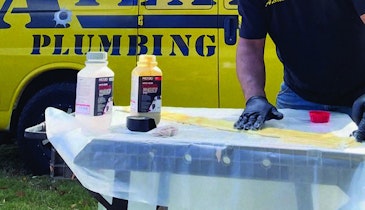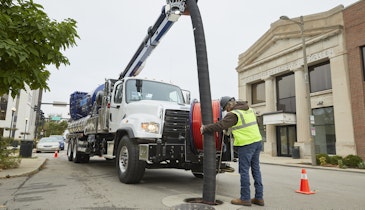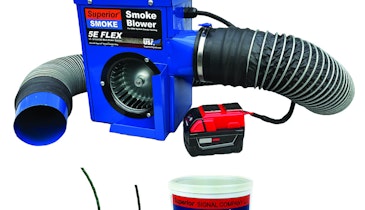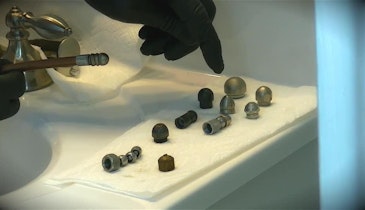A big buzz phrase in business these days is “going green.” This initiative is driven in part by pressure from residential and commercial customers who want to work with companies that are environmentally sensitive.
Growing numbers of contractors realize that operating with a green mindset can differentiate them from competitors. In addition, being environmentally friendly can enhance profits. For example, recycling waste into marketable products can create a new revenue stream and reduce disposal costs.
“We provide total recycling services for our customers,” says Eric Lutz, co-owner of Stanley Environmental Solutions Inc. in Stanley, N.C. “We pump their grease traps, jet their lines, pick up their food waste, and recycle all those wastes into a compost topsoil that we sell on the open market.
“We take all the waste we pump to farmland that we own. There we dewater it and add it to other waste streams that we pick up, such as food waste. Then we add wood chips and cotton waste from textile companies, and compost it all together.
“The mixture is set up in windrows that are about 6 or 7 feet tall, 100 yards long and 8 feet wide,” Lutz says. “We turn the windrows once or twice a week and take daily temperature readings; we try to keep them at a temperature of 125 degrees. In about 16 weeks, the heat cooks all the bacteria out of it. Then we use a front-end loader to scoop it onto a 3/8-inch screener, and with the correct nitrogen and carbon levels, it’s now a ready, marketable product.
“This is our third year of doing this. We take the compost and either sell it to golf courses, landscapers or residential customers, or we mix it with red clay or sand or whatever and come up with different blends of topsoil. It provides us with additional revenue out of waste we’d otherwise have to pay to dispose of. It’s a good thing for our customers and our community because it keeps things out of landfills.
“We’re also looking at making our own biodiesel fuel,” Lutz says. “We could potentially squeeze out some brown grease from the grease trap waste we collect, which is about 600,000 gallons a month. We could potentially get out about 2 percent of that as brown grease and sell it to utility companies as an additional source of fuel, or make biodiesel fuel out of it.”
“It’s important to operate ‘green’ because number one, it just makes common sense to leave a sustainable planet behind for the next generation,” says Desi Hannon, general manager of B. Frank Joy LLC in Hyattsville, Md., which performs pipe inspection and cleaning.
“Plus, on top of that, you can get some cost reductions out of being greener. It just means changing your procedures and your processes. A lot of times, it doesn’t take tremendous change. In the future, going green will play a bigger role in marketing. But for now, we have to be aware of what our contractors and municipalities and all our customers are doing to be greener, so that we’re more aware of their recycling and sustainability needs.
“On our end, we’re benchmarking our carbon footprint,” Hannon says. “Our goal is to reduce our carbon footprint by 5 percent in 2009 through reductions in natural gas and electrical use, and also fuel usage in our vehicles, which include 60 licensed vehicles and 30 pieces of construction equipment.
“We’re looking at how we can better route service trucks, or maybe send one vehicle with more people in it,” he says. “We’re also looking at hybrid trucks as well as using biodiesel fuel, although at this point, it’s hard to find a biodiesel distributor in our area.
“In other areas, we’re insulating our buildings better, using motion-detection lights to save electricity, and switching to programmable thermostats so we can turn the heat and air conditioning down at night. Outside, we’re considering switching yard lights to compact fluorescent bulbs.
“We can’t yet quantify any savings from our green efforts,” Hannon notes. “Rising prices make it difficult to make apples-and-apples comparisons. Instead, we’ll have to measure our energy usage. If we reduce our carbon footprint, we know we’re using less energy, which automatically translates into cost reductions.”
“We’ve operated with a green mindset for the last 15 years,” says Phil Mathewson, president of Mathewson Companies Inc. in Hancock, N.H., which does pipe inspection and cleaning, septic system installation, excavating and paving.
“Our community is a very green community, and I saw several ways we could do things that are environmentally friendly, and that also could increase our bottom line. For example, we started recycling everything we excavated, from asphalt pavement to concrete, then processed and reused them again.
“Basically, we’re getting paid to recycle asphalt, because our customers pay us to remove and stockpile it,” he says. “Of course, it costs money to process it, but we eventually end up selling it back to customers, and we make a very large profit on those materials. In an average year, we make about 30,000 cubic yards of a product we call PavePack, which is made of crushed asphalt mixed with gravel and other recycled materials. It’s used as a sub-base material for paving jobs.
“Other companies pay tipping fees to dispose of the same material that we recycle,” Mathewson says. “Actually, other companies pay us tipping fees to dump their material on our pile, which we then sell back to customers. It absolutely helps to market our company as a green operation. Our customers are very receptive to it. We’ve had several companies that are sold on PavePack, mainly because it’s a recycled material.”





